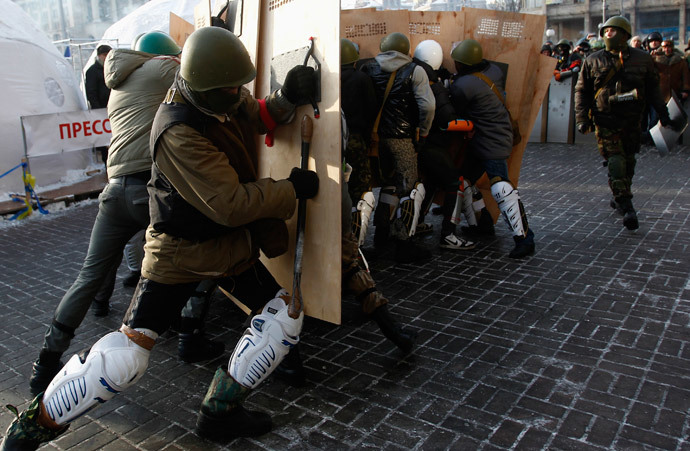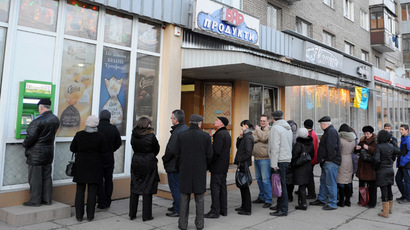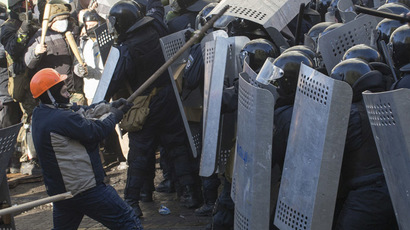'I'll be fighting Jews and Russians till I die': Ukrainian right-wing militants aiming for power
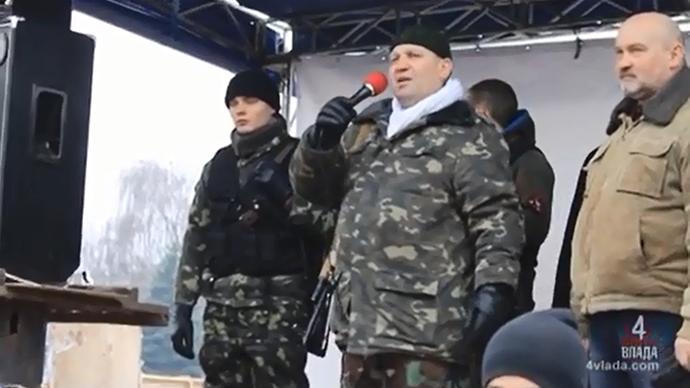
Kalashnikov-wielding members of Ukraine's radical nationalist opposition group, Right Sector, have pledged to resort to arms in their fight against those involved in "lawlessness" and looting, saying they will shoot to restore "order and discipline."
"I warn you, if anyone in this town, this area, engages in 'lawlessness' and looting, Right Sector squads will shoot the bastards on the spot. Then there will be order and discipline," one of the radical nationalist opposition group leaders, Aleksandr Muzychko, said on Friday.
On February 21, when Berkut police officers arrived in the western Ukrainian town of Rovno from Kiev, Muzychko said that if he met them on a battlefield, his hand "would not tremble."
"I would shoot," the Right Sector leader declared in Rovno, where his supporters have already equipped themselves with Kalashnikov rifles.
"If tomorrow these bastards [police] in Kiev won't stop, we'll take over military units, get hold of armored personnel carriers and tanks - we know how to operate them - and go to Kiev. Victory will be ours," Muzychko warned earlier this week.
Aleksandr Muzychko is a notorious nationalist leader. Back in 2007 he pledged to fight against "communists, Jews and Russians for as long as blood flows in his veins," openly saying that leading the fight against all of the above mentioned groups is his "credo."
Back in 1994, Muzychko, aka Sashko Bilyi, arrived in Chechnya to join separatist forces. He took part in numerous battles with federal troops, mainly in the capital Grozny, and personally knocked out three tanks, six armored personnel carriers and a SP vehicle.
According to media reports, he led an entire federal forces unit (presumably the marines) into an ambush. As a result, it was destroyed by the Chechen separatists. For his military merits, the notorious Chechen militant leader, general Dzhokhar Dudayev, presented Muzychko with a "Hero of the Nation" award.
Muzychko later served a term in a Ukrainian prison for racketeering and gangsterism, but he claims it was only for political reasons.
"The next president of the country will be from Right Sector! Our party will also be represented in parliament!" he once promised.
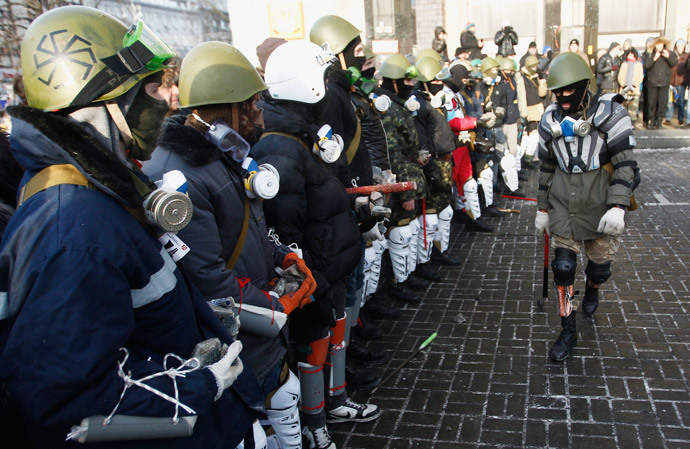
Further unrest among opposition groups
Even though the new peace deal on early elections and constitutional reforms reached between Ukrainian President Viktor Yanukovich and opposition leaders was finally signed, thousands are still protesting in central Kiev. Vitaly Klitschko, opposition leader and head of the UDAR party was booed when he portrayed the latest deal as “very important.” He even attempted to speak about the agreement during a recent memorial service for a protester killed during recent clashes.
Dmitry Yarosh, Right Sector radical nationalist opposition group leader, told protesters that the deal between the Ukrainian president and the opposition is unacceptable, saying their ultimate goal is Yanukovich's resignation.
“The Right Sector will not lay down its arms,” the Unian news agency quoted him as saying. “The Right Sector will not remove the blockade of one of the government buildings until our most important requirement is fulfilled – the resignation of Yanukovich.”
The group rose to fame when its members, equipped with Molotov cocktails and bombs, clashed with police in central Kiev in mid-January.

Yarosh even proposes the liquidation of the pro-government Party of Regions and the Communist Party of Ukraine, calling them criminal groups whose activity must be stopped.
“Two anti-national groups have been acting this year in Ukraine, they are responsible for numerous misfortunes of the Ukrainian nation,” said Yarosh on his Facebook page, adding that these two groups are the Party of Regions and the Communist Party of Ukraine. He urged Right Sector members to stop the activity of these parties “by all means.”
Meanwhile, the so-called Spilna sprava (Common Cause) opposition movement is demanding that the Ukrainian Parliament, (the Verkhovna Rada) and Ukrainian President Viktor Yanukovich, all step down.
"Unfortunately, Maidan Square is not a safe place. My detention and custody were to have been decided upon within a few hours," says the group's leader Aleksandr Danilyuk, a lawyer and a rights activist who was earlier involved in campaigns against former President Leonid Kuchma, said on his Facebook page.
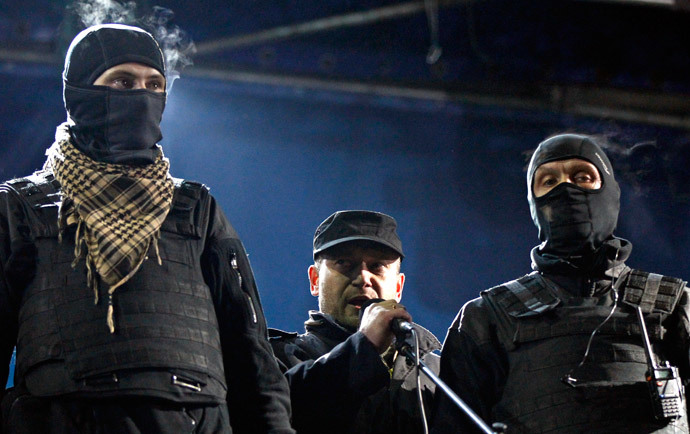
"I've finally reached London today. Will have to coordinate in exile," he added.
Despite the absence of its leader, Common Cause has given an ultimatum to the Kiev prison service demanding freedom for all political prisoners. If their demand is not fulfilled, then will use force, they say.
“Tonight all political prisoners will be released. We have the power and means for it,’" said an official statement of the organization.
Just several months ago, Common Cause was hardly a household name in Ukraine. When President Yanukovich thwarted an integration deal with the EU in November in favor of closer ties with Russia, Common Cause activists joined mass demonstrations calling for closer ties with Europe.
On 25 January in a bid to demonstrate their might, they held the Energy Ministry for a few hours in Kiev. The event reportedly provoked strife within the opposition, with Common Cause activists ignoring the Udar party leader's pleas to leave the ministry. The Justice Minister, Elena Lukash, then threatened to impose a state of emergency unless the radicals gave way. The ministry was only released after a telephone conversation between the Interior Minister, Vitaly Zakharchenko, and US Ambassador to Ukraine, Jeffrey Payette.
